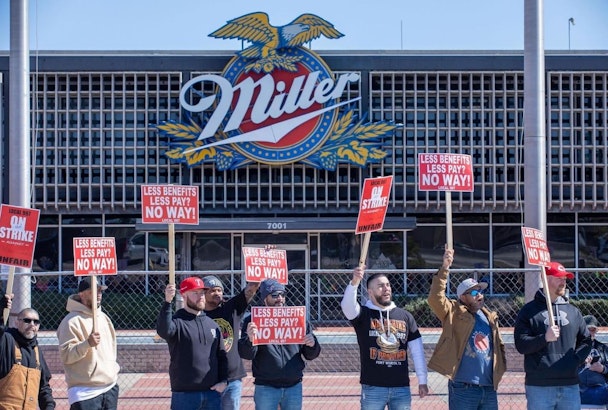Molson Coors faces PR crossroads amid ongoing strike at Fort Worth brewery
As Molson Coors Teamsters hold the line at Fort Worth, crisis PR experts weigh in on what the company should do next.

Molson Coors Teamsters enter their second week of striking at Fort Worth, TX / Credit: Teamsters
Molson Coors’ brewery in Fort Worth, Texas in the throes of a historic strike – a rare occurrence in the facility’s more than 50-year history.
The strike, initiated by Molson Coors Teamsters on February 17, has entered its second week, raising concerns about the company’s public image and the potential impact on consumer trust.
The Teamsters embarked on the strike, expressing dissatisfaction with Molson Coors’ pay package, citing a wage increase of less than a dollar per hour, and the company’s reluctance to negotiate a fair three-year contract proportional to inflation, according to a statement issued by the Teamsters.
Advertisement
As Teamsters general president Sean M. O’Brien put it, “As long as the profits keep flowing to the top, Molson Coors doesn’t give a damn if the workers inside its breweries can afford to take care of their families. They put pennies on the table for the workers behind these products. They want to strip working families of their healthcare ... We’re not taking the disrespect, we’re not accepting the crumbs, and we’re not making concessions.”
The Fort Worth dispute is not occurring in isolation – it comes amid nationwide labor struggles within the brewing industry. Late yesterday, Anheuser-Busch, the country’s largest beer producer, reached a tentative agreement as a contract for 5,000 Teamsters workers was set to expire.
Advertisement
Had both sets of workers striked at the same time, 60% of the nation’s beer market would have been impacted, according to a report by WSWS.org.
“While we respect the Union’s right to strike, we have strong contingency plans and are well equipped to ensure consumers will be able to buy their favorite Molson Coors products,” Molson Coors’ chief communications officer, Adam Collins, told The Drum.
“We are brewing, packaging and shipping from the Fort Worth brewery, our five other US breweries have extra production capacity and we deliberately built up distributor inventories across the country. While the Union has not responded to our last offer, which exceeds local market rates, we remain committed to reaching an agreement that is fair to everyone.”
Suggested newsletters for you
Is a PR crisis brewing?
As Molson Coors Teamsters continue to picket, crisis PR experts have weighed in on the potential challenges for the brand’s reputation and offered diverse perspectives on its next steps.
Many experts are confident that Molson Coors can weather the storm. Kelcey Kintner, senior vice-president of PR firm Red Banyan, viewed the situation as an PR opportunity rather than a catastrophe for Molson Coors, so long as the company remains transparent and professional with its consumers.
“Remember: the media and consumers are sometimes swayed by the ‘David vs Goliath’ storyline in negotiations,” she said. “Pivot away from the villain archetype by remaining transparent and being open about your culture and business model that is designed to drive excellence, support for your team, and ultimately high quality products.”
At the same time, it’s important for employers to convey appreciation for their workers throughout the negotiation process, argues Tim O’Brien, founder of PR firm O’Brien Communications. “The main challenge for the employer is to keep reminding the striking workers it considers them valued employees in spite of the labor dispute, so when the dispute is resolved – and it will be – the employees know they are valued. That’s why it’s critical not to use inflammatory language or do anything that could be taken the wrong way by your people who are walking on that picket line. Always respect your people whether they are on strike or not.”
Others are less optimistic. Andrew Graham, founder and head of strategy at PR firm Bread & Law, for example, considers strikes as indicative of a larger erosion of institutional trust in society, and in companies, symptomatic of deeper organizational issues. “Strikes drive negative press coverage and they put poor management and greed on display publicly,” he says. “But I would argue that the more severe, nuanced problems they cause are the ones that aren’t immediately visible from the outside.”
For instance, Graham says, labor disagreements “can pit different departments within the company against one another. The ordinary, routine PR and marketing advice is to avoid a strike, but communications and marketing folks typically aren’t leading negotiations with union leadership. Strikes can sow division among executive ranks. They can harm relationships with vendors, suppliers and other counterparties.”
Others highlight the broader trend of workers joining picket lines around the nation, beginning last year with ‘Hot Labor Summer’ and ‘Striketober,’ and the need for executives to understand the economic challenges workers face.
“We are seeing the issue of low wages and record profits being a huge topic of conversation within society and the business marketplace,” says Dr. Karen Freberg, a professor of strategic communication at the University of Louisville. “Layoffs, firings or employees noting that their salaries have not changed, but leadership and shareholders have benefited by record profits, has been a growing crisis that has hit many industries.”
How should the brand respond?
As a resolution between the Teamsters and Molson Coors looms, experts agree that addressing workers’ demands is a win-win situation. Not only does it cultivate a healthier workplace and prevent future strikes, but it also is fundamentally advantageous for business.
Achieving a healthy workplace culture, O’Brien suggests, requires that employers fairly compensate workers and offer strong benefits packages.
But of equal importance, “employers must give employees a safe place to work, and if it wants to ensure productivity and reduce turnover rates, companies need to build a strong workplace culture so those employees want to work there and stay there,” he says. “If they can achieve this, it’s very good for business and for the employees.”
For the time being, Molson Coors is the captain of its own labor destiny, says Bread & Law’s Graham. “Any company has a lot of room to maneuver, from a reputational standpoint, if resolving a strike costs a little bit more, in terms of compensation or benefits, than their bean-counters would like it to,” he says.
“Certainly,” he adds, “ensuring that workers are treated with basic fairness and dignity can be a pro-business proposition during a time of historic corporate profits. In a better world, this would be the norm.”
For more, sign up for The Drum’s daily newsletter here.

